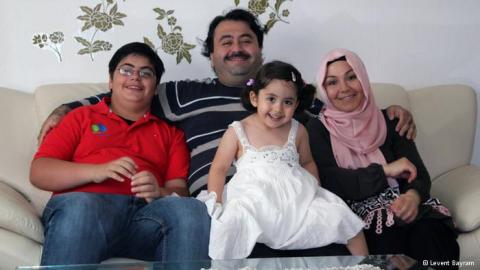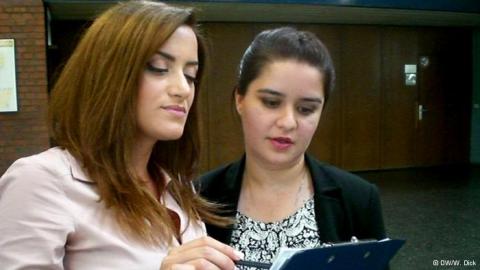"German" Turks want dual citizenship and political clout

A Muslim Turkish family portrait: Levent Bayram, wife and kids
The following was taken from Deutsche Welle's report: Germany's Turks favor duel citizenship at http://www.dw.de/germanys-turks-favor-dual-citizenship/a-16954911
German law only grants dual citizenship in exceptional circumstances. It's often a problem for German Turks, many of whom feel marginalized as they don't want to give up their Turkish passports.
Levent Bayram is 39 years old. He was born in Berlin in the 1970s, when children born to immigrants in Germany had no choice but to take on their parents' nationality, regardless of where they were born.
Levent still only has a Turkish passport, as he was never naturalized in Germany. If he was to become German, he would have to renounce his Turkish passport. It's not an option for him, as he has "such a strong emotional connection to his parents' home country," he tells DW.
Levent spent a few years working in Turkey selling books and telephones. Now he works as a social media manager for the German-Turkish Journal in Berlin, but he doesn't want to lose touch with Turkish culture. For him, a Turkish passport symbolizes and strengthens that connection.
People like Levent don't understand why German law makes them choose between two nationalities, when EU citizens have the option of dual citizenship. "Why can't we Turks have the same?" he asks, clearly feeling disadvantaged.
He points out that he has always felt at home in Germany and that he has never had any problems or been mistreated.
Levent loves Germany, but he also feels a strong attachment to Turkey, which is why he favors dual citizenship. He would also like to become involved in politics. "I have so many ideas, but I can't do anything here," he says. To change that, he would have to become a German national, "but not if I have to give up my Turkish passport," he insists.
Confused identities
German law is tearing apart his whole family, as current regulations make your place of birth the decisive factor. So, Levent's brother is Turkish, his sister is German, his wife is Turkish.
His daughter, who was born four years ago in Berlin, is German. His son, who was born 15 years ago in Turkey, is Turkish. In three years' time, he will have to decide if he wants to be German. He says he will say no. Not because he feels a strong connection to Turkey, but because he doesn't feel at home in Germany.
Note that Levent "loves Germany" but he loves Turkey more. In spite of his mixed-up rhetoric, he clearly feels loyalty to Turkey over Germany. But he wants to become involved in politics in Germany- that's what he cannot do without becoming a citizen. He wants to change Germany in the direction of being more Turk-friendly. He wants a Germany in which he feels just as much "at home" as he does in Turkey.
[...]

Turks Sevda and Arzu want to go into German politics, too
Career Restrictions?
Sevda Adiguezel describes a situation many German Turks would recognize. "In Turkey, I'm the German who is actually Turkish. In Germany, I'm the Turk who is actually German," she tells DW. She always feels like she doesn't belong. The 26-year-old studies general management in Cologne, speaks perfect German and feels at ease in German society.
She rejects the implication that she needs a German passport to make her fully "integrated," given that she is a third-generation German Turk. Nevertheless she decided to become a German national, so she can get involved politically. "If we don't speak up, even our grandchildren will still not have the rights we're entitled to," she tells DW. [She speaks as a member of the Turkish community. -cy]
Sevda and her friend, engineering student Arzu Badak, are involved in the academic organization "Dein Köln e.V." ("Your Cologne") Badak, too, decided in favor of German citizenship, as she believes it will help her career and allow her to get involved in politics.
Both are trying to motivate young immigrants to get into politics. Sometimes words fail her when people say "you're a German national, but you're not German."
"That hurts," she says, adding that there was still a lot to be done to change the indecisive nature of German immigration policy to make it clear and fair for everyone.
Two young Turkish women educated in Germany now want to enter politics so they can help change German immigration policy.
What are the rights that they are entitled to that they don't have? Sevda feels hurt when she's told she's not German - but, in fact, she is not German! She is coming from an emotional perspective when she thinks she can enjoy the great benefits offered by Germany, and at the same time make it more Turkish.
Category
Immigration, Germany, Race- 975 reads









